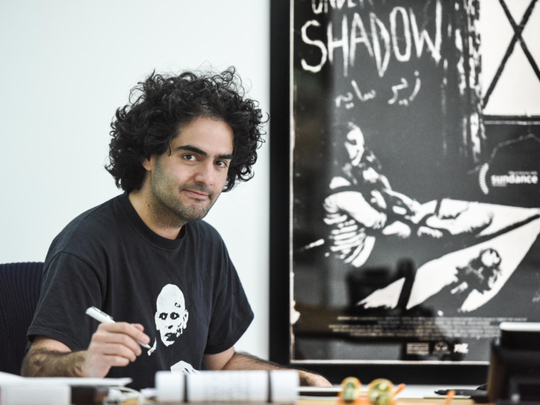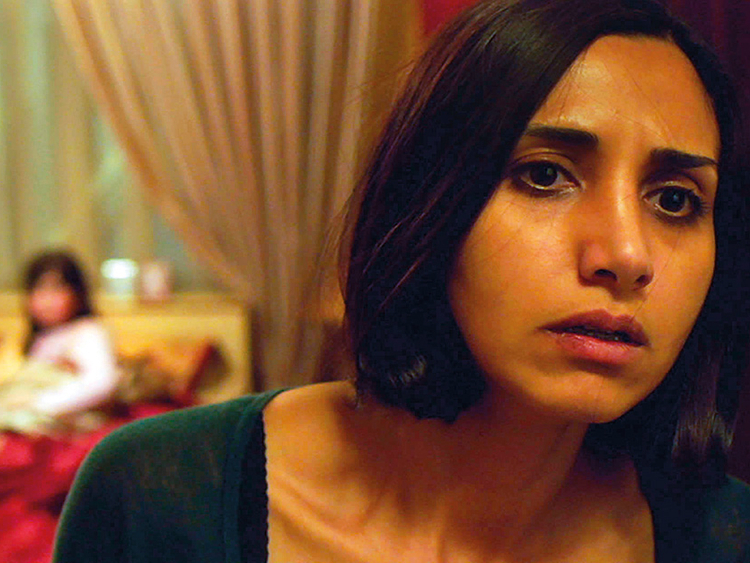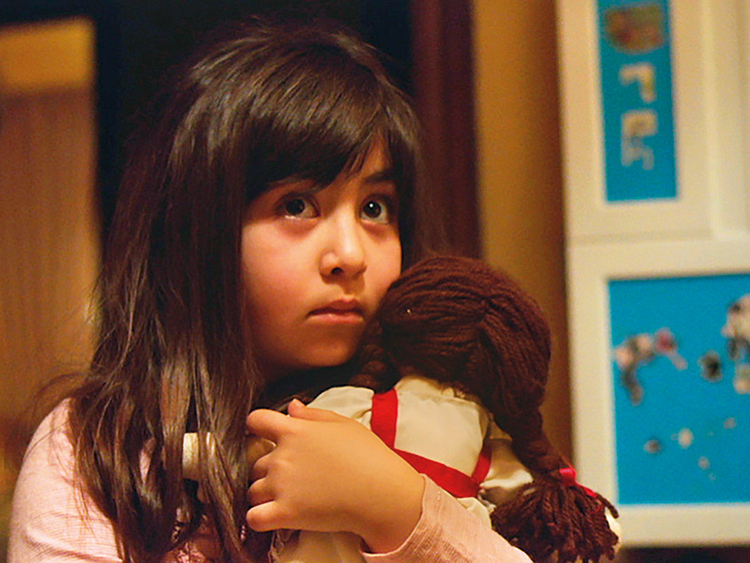
Pictures of a war-torn Tehran and issues surrounding the aftermath of a revolution are not what you would ordinarily expect from a horror movie. However, Babak Anvari has put all those elements in his debut film and made a success of it.
Under the Shadow, a movie set in the midst of the Iran-Iraq war in the 1980s, has everything that you would expect from a horror/thriller film and more.
READ MORE:
My life of fear in a war-torn city
It rather cleverly reminds the audience of a somewhat forgotten war, provides a glimpse of how it affected ordinary families and some of the social restrictions imposed on people in the country during that time.
“I thought using an engaging story as a hook, I can introduce the international audience to that time and era and that war, which was a brutal, long war... one of the longest wars in the 20th century.
That was definitely one of the reasons, to show the world that side of Iran, the side you don’t normally see in the media,” Anvari told Weekend Review during a screening visit to Dubai.
Shot in Jordan in just 21 days, the film follows the story of a mother, Shideh, whose husband, a doctor, is summoned to serve in the military, leaving the young mother and their daughter, Dorsa, alone in their Tehran apartment. An air strike sees a missile land on the family’s apartment building.
However, it doesn’t explode but instead opens the way for an evil presence, known in Iranian superstitions as jinn, into the building.
As Shideh’s neighbours flee Tehran to escape bombardment, the horror of being alone with the jinn sets in for her and Dorsa.
The film touches upon several issues that affected the lives of people in Iran at the time, including the effect of men being called to serve in the military on families, displacement and implementation of strict religious codes that people had to adhere to.
Censorship
Even issues surrounding the heavy censorship on what was acceptable to be watched in the privacy of one’s home are highlighted primarily through Shideh’s obsessive Jane Fonda workout regime, an illegal content at the time due to Fonda’s revealing attire.
Shideh is seen instructing four-year-old Dorsa to not let anyone know they own the video.
So how did Anvari, who wrote and directed the film, come up with the concept?
“I was tapping into childhood memories. I was born right in the middle of the Iran-Iraq war in Tehran and by the time the war ended I was more or less the same age as the child in the film,” he says. “I just thought it was such an intense time because of the war and everything, it was a great setting for a psychological thriller/horror.”
And intense is exactly what this movie is. The gradual confusion about whether you are watching a film based on real events soon disappears with scenes that make you jump out of your seat, a gentle reminder that you are indeed watching a horror movie.
But wasn’t the London-based director worried about choosing Iran for the setting of the film?
“I realised that there obviously wasn’t that many Iran-set horror films and yeah, I was very conscious about that. And I thought I’ll try my best to do something different.
“The story if you think about it is a very classic gothic tale. A mother and child, haunted house, just in a different setting, which I think is why the international audience finds it interesting. It’s not like Victorian England, its Tehran in the 80s,” he added.
Anvari took another major risk with the film when he decided to shoot the entire movie in Farsi, a decision that cost him the opportunity to work with a number of producers who did not feel comfortable with subtitles.
“I was adamant from day one that I wanted to shoot it in Farsi for the sake of authenticity. At the end of the day the film is set in the 80s in Tehran, and I thought it would be ridiculous people walking, speaking in English with bad accents, there is just something really fake about that.”
“If the story is compelling enough language will not be a barrier. Digital platforms such as Netflix are actively promoting that. They show films that have half of it in a foreign language,” he says.
The risks paid off as the film did very well at film festivals and won wide critical acclaim.
Under the Shadow picked up the Bafta Film Award for Outstanding Debut by a British Writer, Director or Producer. It was even put forward by the UK as its best foreign film category entry for the Oscars, although it didn’t get shortlisted by the academy.
The film was shown in Dubai last year as part of Cinema Akil’s continuous efforts to give independent filmmakers a platform to showcase their work in the UAE.
While many independent filmmakers say that one of their biggest challenges is having a venue that screens their work, Anvari does not seem concerned about the issue and is rather upbeat and positive about it.
Hope
“I think there is a lot of hope for independent films, especially in the digital age. Digital platforms like Amazon Prime or Netflix, these are giving new opportunities to independent filmmakers.
“Obviously, the big Hollywood films, people go and watch them in cinema but everyone has these massive TVs now in their houses, so as long as they have access to the film they will happily sit and watch independent films. I think it is actually an exciting time for independent filmmakers,” he says.
“Iran makes a lot of independently-financed films that go out of Iran and are shown at festivals, and become very popular. It is a niche market and not everyone is into independent films, especially foreign language, but there is a market.”
Anvari has already started working on his next project which will be a thriller set in the UK.














